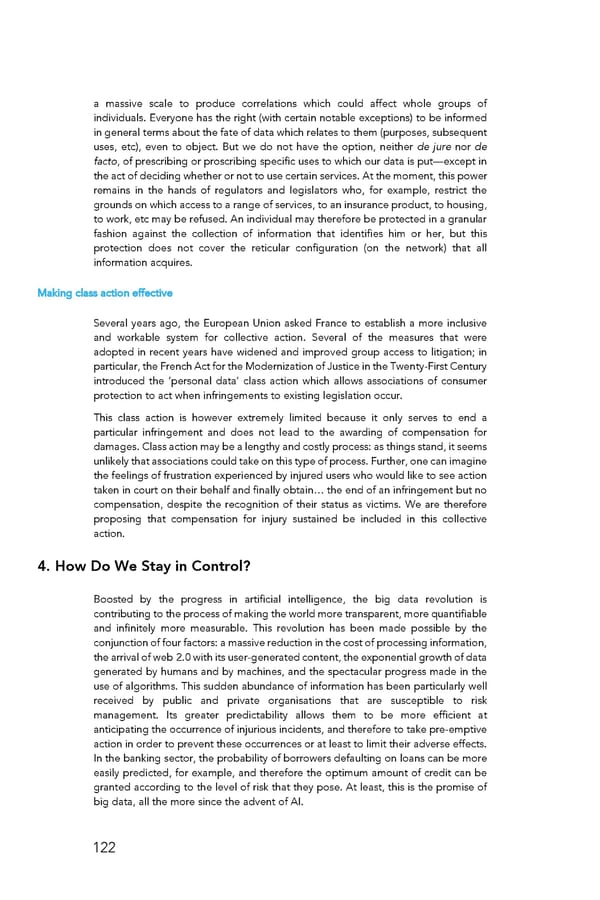a massive scale to produce correlations which could affect whole groups of individuals. Everyone has the right (with certain notable exceptions) to be informed in general terms about the fate of data which relates to them (purposes, subsequent uses, etc), even to object. But we do not have the option, neither de jure nor de facto, of prescribing or proscribing specific uses to which our data is put—except in the act of deciding whether or not to use certain services. At the moment, this power remains in the hands of regulators and legislators who, for example, restrict the grounds on which access to a range of services, to an insurance product, to housing, to work, etc may be refused. An individual may therefore be protected in a granular fashion against the collection of information that identifies him or her, but this protection does not cover the reticular configuration (on the network) that all information acquires. Making class action effective Several years ago, the European Union asked France to establish a more inclusive and workable system for collective action. Several of the measures that were adopted in recent years have widened and improved group access to litigation; in particular, the French Act for the Modernization of Justice in the Twenty-First Century introduced the ‘personal data’ class action which allows associations of consumer protection to act when infringements to existing legislation occur. This class action is however extremely limited because it only serves to end a particular infringement and does not lead to the awarding of compensation for damages. Class action may be a lengthy and costly process: as things stand, it seems unlikely that associations could take on this type of process. Further, one can imagine the feelings of frustration experienced by injured users who would like to see action taken in court on their behalf and finally obtain… the end of an infringement but no compensation, despite the recognition of their status as victims. We are therefore proposing that compensation for injury sustained be included in this collective action. 4. How Do We Stay in Control? Boosted by the progress in artificial intelligence, the big data revolution is contributing to the process of making the world more transparent, more quantifiable and infinitely more measurable. This revolution has been made possible by the conjunction of four factors: a massive reduction in the cost of processing information, the arrival of web 2.0 with its user-generated content, the exponential growth of data generated by humans and by machines, and the spectacular progress made in the use of algorithms. This sudden abundance of information has been particularly well received by public and private organisations that are susceptible to risk management. Its greater predictability allows them to be more efficient at anticipating the occurrence of injurious incidents, and therefore to take pre-emptive action in order to prevent these occurrences or at least to limit their adverse effects. In the banking sector, the probability of borrowers defaulting on loans can be more easily predicted, for example, and therefore the optimum amount of credit can be granted according to the level of risk that they pose. At least, this is the promise of big data, all the more since the advent of AI. 122
 For a Meaningful AI - Report Page 121 Page 123
For a Meaningful AI - Report Page 121 Page 123